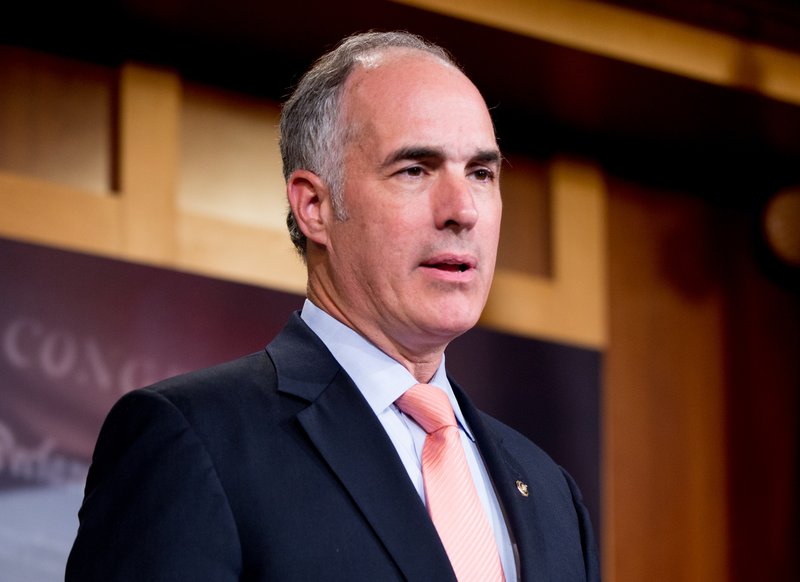WASHINGTON -- Supporters of the Iran nuclear deal are on the cusp of clinching the necessary Senate votes to keep the agreement alive, after two senators on Tuesday announced their support for the deal.
Democrats Bob Casey of Pennsylvania and Chris Coons of Delaware became the 32nd and 33rd senators to back the agreement, putting supporters one shy of the 34 votes needed to uphold a presidential veto of Republican legislation aimed at blocking the agreement.
"This agreement will substantially constrain the Iranian nuclear program for its duration, and compared with all realistic alternatives, it is the best option available to us at this time," Casey said in a statement.
In remarks at the University of Delaware, Coons said, "I will support this agreement, despite its flaws, because it is the better strategy for the United States to lead a coalesced global community in containing the spread of nuclear weapons."
Earlier Tuesday, Sen. Ben Cardin of Maryland, the top Democrat on the Foreign Relations Committee, predicted that supporters of the deal would get to 34 votes by week's end.
Republicans in Congress oppose the deal, which aims to restrain Iran's nuclear program in exchange for relief from economic sanctions. The Israeli government is against it, contending that concessions made to Iran could empower that country.
Two Democratic senators have come out against the deal -- Charles Schumer of New York and Robert Menendez of New Jersey.
With supporters nearing 34 votes, some have begun to aim for 41 votes, which would block the disapproval resolution and keep President Barack Obama from having to veto the bill, as he has promised to do. That would require at least eight of the 11 undeclared Democratic senators to back the deal.
In a session with students at Johns Hopkins University, Cardin, who said he remains undecided, discussed the pros and cons and said he will decide based on which approach is likeliest to keep Iran from acquiring nuclear weapons.
"I think it's a tough call, and I sort of bristle when people say, 'This is such an easy decision, why haven't you made it?'" Cardin said. "I don't think it is an easy judgment call. I think there are high risks either way."
Cardin said the pressures from both sides have been enormous. The American Israel Public Affairs Committee was hosting an event in a Baltimore suburb Tuesday evening aimed at elevating opposition from Cardin's constituents, but in a statement the group's spokesman stopped short of holding out hope for blocking the deal.
"Three facts about this flawed deal are crystal clear -- polls show the American people reject it, a bipartisan majority in Congress will oppose it and no major arms control agreement has ever been approved with only the support of a partisan congressional minority," said Marshall Wittmann, a spokesman for the lobbyist group.
The disapproval resolution is likely to pass the GOP-led House, but Democratic leader Nancy Pelosi has pledged to have enough votes to sustain Obama's veto -- which could only be overturned with two-thirds votes in both chambers.
In a letter to Coons seeking his support for the deal, Obama pledged the agreement would not foreclose any options for the U.S. "It does not take away any of our own capacity to respond to Iranian threats to our friends and allies in the region, particularly Israel," the president wrote in the letter released Tuesday by Coons' office.
Casey said he reached his decision only after speaking with the president three times in July and August.
Meanwhile, the head of Iran's elite Revolutionary Guard said Tuesday that the U.S. is still the "Great Satan," regardless of the nuclear deal.
The comments by Gen. Mohammad Ali Jafari, reported by the official Guard website, said that "the enmity against Iranian nation by the U.S. has not lessened and it has been increased."
"We should not be deceived by the U.S.," Jafari reportedly said. "It wants to infiltrate into Iran, resorting to new instruments and method."
The Guard and hard-liners remain suspicious of the U.S., even as authorities look over the accord.
Earlier Tuesday, Ayatollah Mohammad Yazdi, the head of Iran's Experts Assembly, which oversees the nation's Supreme Leader and institutions under his supervision, said the nuclear deal will not alter Iran's policy toward the United States.
"The Islamic Republic of Iran considers the U.S. its No. 1 enemy," Yazdi said. "If you try to discover the root of the sedition that is happening around us today, you will identify U.S. as its main supporter."
Information for this article was contributed by Nasser Karimi and Amir Vahdat of The Associated Press.
A Section on 09/02/2015

